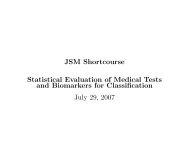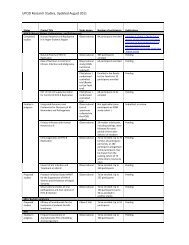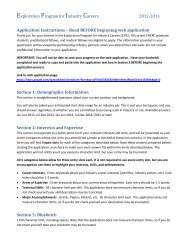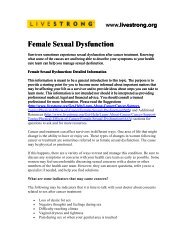Summer Undergraduate Research Program - Fred Hutchinson ...
Summer Undergraduate Research Program - Fred Hutchinson ...
Summer Undergraduate Research Program - Fred Hutchinson ...
You also want an ePaper? Increase the reach of your titles
YUMPU automatically turns print PDFs into web optimized ePapers that Google loves.
The Art of the (Recommendation Letter) Request<br />
Letters of recommendation are an extremely important component of any training program or graduate<br />
school application . The information contained (or excluded) from a letter of recommendation has the<br />
ability to impact who gets interviewed, admitted, and in some cases, awarded financial support.<br />
There is an art to requesting a letter of recommendation and your ability to incorporate these suggestions<br />
when requesting a letter of support from your references will likely result in an influential testimony that<br />
may be the difference between being accepted into the program of your choice versus being waitlisted or<br />
worse, rejected .<br />
Tip 1: Put it in writing!<br />
Sure, you can ask your references to submit a letter of recommendation on your behalf in-person, but the<br />
surest way to guarantee that it gets done is to submit your request in writing, whether that be via email or a<br />
handwritten note (you will inevitably earn a prompt and thoughtful recommendation letter by submitting<br />
your request with a Starbucks gift card or some other token of your appreciation) .<br />
Tip 2: Make it easy.<br />
The best way to ensure your reference will submit a quality letter of recommendation on your behalf is to make<br />
it easy to do so . You can simplify this request by giving your references the following information: a) the name<br />
of the program to which you are applying and a brief description of what the program entails; b) the name of<br />
the sponsoring institution; c) a brief description of how the program fits in with your career goals; and d) a<br />
brief description of what you will contribute to the program and how you will benefit from participating. The<br />
last and possibly most important information to convey is: e) when the letter is due, to whom the letter should<br />
be addressed, and the options for submitting the letter, i .e . via email, fax, or mailing address .<br />
Tip 3: Be selective!<br />
Most training program and/or graduate school applications require a letter of recommendation from<br />
at least three individuals . Choose your references wisely - letters of recommendation that come from<br />
individuals in a department or field similar to the program for which you are applying are viewed more<br />
favorably by the selection committee than recommendation letters from a former employer or teacher in a<br />
non-related field.<br />
Tip 4: Send a reminder.<br />
The best way to leave a poor impression with the selection committee is to submit your application after the<br />
deadline . The surest way to guarantee that your recommendation letter is submitted on time? Send your<br />
reference a friendly reminder – preferably one week prior to the application deadline .<br />
Tip 5: Express your gratitude!<br />
The last and most important gesture to consider when requesting a recommendation letter is often the most<br />
overlooked. In short; send your references a handwritten NOTE OF THANKS! If you have not already given<br />
your references some token of your appreciation, i .e . a Starbucks gift card, a box of Girl Scout cookies, now<br />
may be the time to do so, especially if you learn that you were accepted into the program to which you applied .<br />
70
















